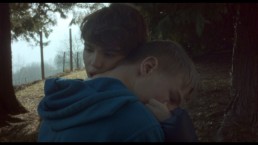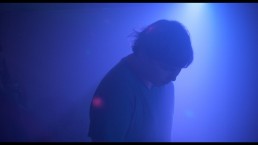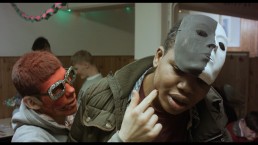Marana
Sulle montagne italiane l’estate è quasi finita. Mirko e Max si incontrano nella foresta e vagano in luoghi abbandonati, cercando di immaginare un futuro possibile, mentre Giorgia e Lorenzo vivono timidi momenti di intimità. Sullo sfondo, la quotidianità di una comunità di adolescenti con ASD, che riescono a vivere in equilibrio tra reale e fantastico, fisico e metafisico, paura e piacere di perdersi. Marana è un viaggio nel mondo dell’autismo, dove i desideri della giovinezza sono registrati nel loro semplice divenire.
In the Italian foothills, summer is almost over. Mirko and Max meet in the forest and wander in abandoned places, trying to imagine a possible future, while Giorgia and Lorenzo live timid moments of intimacy. In the background, a daily life of a community of teenagers with ASD, who manage to live in balance between real and fantastic, physical and metaphysical, fear and pleasure of getting lost. Marana is a journey into the world of autism, where the desires of youth are recorded in their simple becoming.
Titolo originale: Marana
Titolo internazionale: Marana
Formato di ripresa: FullHD
Formato di proiezione: DCP, Apple ProRes HQ
Rapporto immagine: 1:1:85
Colore / bn: Colore
Durata: 64 min
Lingua: Italiano, Inglese
Sottotitoli disponibili: Italiano, Inglese
Anno: 2020
Produzione: Puma Punka + Ezme Film
In coolaborazione con: Diplomart, Club Ambassador
Con il supporto di: MeA – Mosaicoeaias Soc. Coop, A..A.S. Valdagno Onlus, APS Famiglie Mosaico
Original title: Marana
International title: Marana
Shooting format: FullHD
Screening format: DCP, Apple ProRes HQ
Aspect ratio: 1:1:85
Color / bw: Colore
Runtime: 64 min
Language: Italian, English
Subtitles: Italian, English
Year: 2020
Production: Puma Punka + Ezme Film
Co-production: Diplomart, Club Ambassador With the support of: MeA – Mosaicoeaias Soc. Coop, A.I.A.S. Valdagno Onlus, APS Famiglie Mosaico
Regia e fotografia: Giovanni Benini, Davide Provolo
Suono di presa diretta: Giovanni Benini, Davide Provolo, Matias Campaci
Montaggio: Pierpaolo Filomeno
Musiche originali: Lite Orchestra (Matias Campaci, Thomas Pizzini)
Sound design: Ludovic Van Pachterbeke
Color grading: Stefano Bellamoli
Missaggio: Samuele Tezza
Organizzazione generale: Ginevra Gadioli
Directors and cinematographers: Giovanni Benini,
Davide Provolo
Sound recordists: Giovanni Benini, Davide Provolo, Matias Campaci
Editor: Pierpaolo Filomeno
Original soundtrack: Lite Orchestra (Matias Campaci, Thomas Pizzini)
Sound designer: Ludovic Van Pachterbeke
Colorist: Stefano Bellamoli
Sound mix: Samuele Tezza
Executive producer: Ginevra Gadioli
Beldocs | International Competition. Serbia (2020) AegeanDocs | International Competition. Grecia (2020) Corsica.Doc | Nouveaux Talents. Francia (2020) Laceno d’Oro | Doc Competition. Italia (2020) Ibiza CineFest | Panorama. Spagna (2021) Ethnocineca | Cinema-programme. Austria (2020) Freiburger Film Forum. Germania (2021) Festival Biblico. Italia (2021) Bridge Film Festival | Out of Competition. Italia (2021) Film Festival della Lessinia | Montagne Italiane. Italia (2021) FLIGHT – Mostra del Cinema di Genova | Doc Competition. Italia (2021) Matera Film Festival | Doc Competition. Italia (2021) MAAM Muestra de Antropología Audiovisual de Madrid | Feature Doc Competition. Spagna (2021) Firenze Film Festival | Doc Competition. Italia (2022). Premi e riconoscimenti: Firenze Film Festival | Premio per la miglior fotografia; Film Festival della Lessinia | Menzione Speciale Premio Cassa Rurale Vallagarina
Beldocs | International Competition. Serbia (2020) AegeanDocs | International Competition. Greece (2020) Corsica.Doc | Nouveaux Talents. France (2020) Laceno d’Oro | Doc Competition. Italy (2020) Ibiza CineFest | Panorama. Spain (2021) Ethnocineca | Cinema-programme. Austria (2020) Freiburger Film Forum. Germany (2021) Festival Biblico. Italy (2021) Bridge Film Festival | Out of Competition. Italy (2021) Film Festival della Lessinia | Montagne Italiane. Italy (2021) FLIGHT – Mostra del Cinema di Genova | Doc Competition. Italy (2021) Matera Film Festival | Doc Competition. Italy (2021) MAAM Muestra de Antropología Audiovisual de Madrid | Feature Doc Competition. Spain (2021), Firenze Film Festival | Doc Competition. Italy (2022). Prizes and awards: Firenze Film Festival | Best cinematography; Film Festival della Lessinia | Special Mention
Come vi è venuta l’idea per questo documentario?
Il progetto è iniziato nel 2015, grazie alla Lite Orchestra, Matias Campaci e Thomas Pizzini compositori ed esecutori della colonna sonora di Marana. I due musicisti avevano avviato un laboratorio sperimentale di musica elettronica con gli ospiti di Marana, una comunità per minori affetti da disturbo dello spettro autistico. Abbiamo iniziato a riprendere le loro sessioni e presto ci siamo innamorati del luogo e dei ragazzi e abbiamo deciso di sviluppare un progetto di film. Non eravamo, e tutt’ora non siamo, esperti sul tema dell’autismo ma abbiamo avvertito una connessione immediata con i protagonisti e abbiamo sentito la necessità di ritrarre l’atmosfera intensa e ipnotica di Marana.
Questo film tratta di adolescenti con autismo. Che sfide deve affrontare il cinema nel raccontare tematiche sociali?
Il tema dell’autismo ha assunto molta importanza nella nostra società a causa della crescita esponenziale dei casi di autismo rilevati, noi pensiamo sia fondamentale provare a descrivere questo mondo eterogeneo attraverso delle lenti diverse. La narrativa finora si è concentrata soprattutto sulla condizione delle persone con autismo mentre noi abbiamo privilegiato un racconto focalizzato sulla persona e sulla sua complessità. Le rappresentazioni dell’autismo hanno la tendenza a escludere gli aspetti più duri e impegnativi della quotidianità di chi è affetto da ASD, delle loro famiglie e dei professionisti coinvolti. Il rischio, quindi, è di creare una rappresentazione non autentica e lontana dalla realtà. Noi abbiamo scelto un approccio non narrativo: il film si presenta come un viaggio rituale all’interno del mondo dell’autismo, dove i desideri e l’adolescenza vengono raffigurati nella lora essenza.
Lavorare a questo progetto come ha cambiato la vostra prospettiva sulle persone autistiche? Trascorrendo del tempo con loro, cosa avete compreso che altrimenti sarebbe difficile capire?
In passato sia io che Davide abbiamo vissuto delle relazioni familiari con persone affette da malattie mentali, ma la produzione di questo film ci ha dato un’idea più approfondita di questo universo. I nostri protagonisti hanno una vita dura e gli è difficile trovare una collocazione nel mondo. Hanno un potenziale illimitato e sono molto creativi, anche se dall’esterno sembra che la loro vita non segua alcuna direzione. Vivono in un eterno presente fatto di emozioni e ossessioni che assumono un significato quasi mistico. Il film cerca di restituire i sentimenti di empatia e coinvolgimento che abbiamo provato durante la nostra permanenza al centro. Marana è il nostro primo film come registi e questa esperienza ci ha molto arricchiti, e di questo siamo loro molto grati.
Come hanno reagito all’idea di partecipare al film?
Riprendere delle persone è sempre una questione delicata, noi pensiamo che la sensibilità e la consapevolezza siano degli strumenti fondamentali per ogni autore. A Marana è stato semplice entrare in contatto con i protagonisti visto che la comunicazione con loro era basata, prevalentemente, sul linguaggio del corpo e le espressioni del viso. La relazione che si è sviluppata tra noi è stata molto diretta e trasparente. I ragazzi del centro hanno risposto molto naturalmente alla telecamera, amavano essere filmati ed erano molto incuriositi dal nostro equipaggiamento tecnico (alcuni cavi e uno schermo ne hanno pagato le conseguenze!). Ci siamo divertiti insieme suonando musica, creando ed esplorando i set. Gli operatori della comunità si sono fidati di noi e ci hanno concesso un grande grado di libertà nell’interazione.
Com’è stato lavorare con loro? Cosa avete imparato da questi adolescenti?
Il nostro metodo filmico si basa sul cercare e far risaltare le affinità tra noi e le persone che stiamo riprendendo. L’idea iniziale era di narrare il fenomeno dell’autismo in un modo che potesse evocare la forza, la libertà e il potere visionario dei nostri giovani protagonisti e abbiamo vissuto con loro dei momenti in cui i confini tra il reale e il fantastico, il fisico e il metafisico si confondevano. I ragazzi di Marana ci hanno mostrato determinazione e costanza nel seguire i propri desideri nonostante la rigidità della società.
I ragazzi del film trovano il modo di giocare e divertirsi, come tutti gli adolescenti hanno i loro idoli, desideri e il loro modo di amare. Il vostro film può aiutare a superare i pregiudizi e gli stereotipi sulle persone come loro?
Questo film è stato fatto con l’obiettivo di superare i pregiudizi sulle persone affetti da ASD. Le leggi di ogni nazione presentano dei buchi legislativi, ad esempio la legge italiana ha delle disposizioni molto chiare riguardo agli adulti con ASD ma è mancante riguardo ai minori, che sono affidati alle famiglie finché non raggiungono i 18 anni. La zona grigia che si crea a causa di queste lacune normative spesso si traduce in una situazione di discriminazione e svantaggio che contribuisce alla crescita degli stereotipi nella nostra società. Pensiamo che il ruolo dell’arte e del cinema sia di illuminare e raccontare le situazioni dove la politica e la legge non arrivano e di renderci tutti più consapevoli e capaci di intervenire.
Come hanno reagito le persone al film? Cos’è stata la cosa più interessante?
L’anteprima di Marana si terrà il 7 settembre al 13°Beldocs e siamo ansiosi di ascoltare l’opinione del pubblico! Abbiamo già organizzato alcune proiezioni private con le famiglie che ci hanno sorpreso con reazioni e commenti molto positivi. Per molti genitori il film è stata un’esperienza quasi catartica, perché hanno avuto la possibilità di condividere le loro responsabilità e preoccupazioni con gli spettatori, anche se solo per un’ora. Ci hanno detto che è stato un momento di trasfigurazione della realtà quotidiana dei loro figli in tematiche universali.
Giovanni Benini, Davide Provolo
Intervista per Beldocs (Serbia, 09.2020)
How did you get an idea to make this documentary?
The project started in 2015, when our friends Matias Campaci and Thomas Pizzini (aka Lite Orchestra duo, composers and performers of Marana soundtrack) started an experimental electro-music lab with the teenagers living in Marana, a residential care center for minors with ASD. We began shooting their performances in the center but soon we fell in love with the place and its residents and we decided to develop a film project. We were not, and still aren’t, experts on ASD topics, but we felt an immediate connection with the protagonists and we felt the need to paint a picture of the intense and hypnotic atmosphere of Marana.
This movie is about the teenagers with autism. How much the film, as an art form, is challenging for the topics like human interest and social issues?
The topic of autism has gained relevance in our societies because of the exponential growth of the reported cases and we think that it is important to describe this varied world through different and new lenses. The narrative has to shift from one focused only on the condition of the people affected by ASD to a storytelling that revolves around the person in his or her complexity. The representations of autism has the tendency to clean and cut out the challenging and hard aspects of the daily life of ASD affected people, their families and the professionals involved; the risk may be to create a representation that seems too fictional and detached from the reality. We decided for a non-narrative approach, and our documentary became a ritualized journey into the autism world, where the desires of youth are recorded in their simple becoming.
Did the work with these people change your perspective on autistic people and how? What did you see that couldn’t be seen until we spend more time with them and come closer to the people with mental disability?
In the past both Davide and I have lived some private and familiar relations with people affected by mental illness, but the production of the film has given us a more comprehensive idea of this universe. Our protagonists have a tough life and it is very hard for them to find their place in the world. They have an unlimited potential and a lot of creativity, even if from the outside it looks like they don’t know their direction in life. They somehow live in purity and innocence, a condition that allows them to experience an “eternal present”, embodying a mix of feelings and obsessions, which have almost a mystic meaning. The film gives back the immersion and mimetic identification we lived during our stay in the center. Marana is our debut film as directors and we feel that this experience has helped us to enrich our way of being: we must say a huge thanks to them.
How did they react to idea of participating in the film?
Filming people is always a deep and fragile matter. We think that sensibility and awareness are the fundamental tools for every author. Somehow in Marana it was easy to get in contact with the protagonists since the communication with them was mostly based on body language and facial expressions and not on words. This resulted in a transparent and very direct relationship between the crew and them. They had a great and natural cinematic response, they enjoyed being filmed and were really curious about our technical equipment (some cables and a monitor were destroyed!). We had fun together playing music, creating and exploring sets. The caregivers trusted us and we were allowed to have a high level of freedom in the interaction.
What was your experience in work with them? What did you learn from these teenagers?
Our filmic work lies in underscoring the affinities between us and the people we filmed. The idea was to narrate the phenomenon of autism in a way that could also evoke the strength, the freedom, the visionary power of the young characters. We think we were able to share moments where the real and the fantastic, the physical and the metaphysical, the fear and the pleasure of getting lost are well integrated. They showed us the determination, constancy, dedication and the ability to pursue our desires despite the stiffness of our society.
The teenagers from the film hang out, they find their way to play and have fun. As other teenagers, they have their idols, desires, the way to love etc. How this film can help in overcoming the prejudice and stereotypes about people like them?
The film is made with the purpose of overcoming the prejudices about people with ASD. There is no “us and them”, we are all human beings and we all have the right to live with dignity. The laws of each nation present huge gaps, for example the Italian law states very clear dispositions about adults with ADS but it’s lacking when it comes to teenagers, who are in custody of the families until they turn 18. This grey area created by a lack of legislation translates into situations of discriminations and disadvantages that contribute to the rise of stereotypes in our societies. The role of the art and filmmaking is to shed a light where law and politics don’t arrive and made all of us aware.
How do the people react on the movie? What was the most interesting for them?
Marana will premiere at Beldocs and we are looking forward to hearing the audience’s opinion! We had some private screenings with the families and they surprised us with their positive feedbacks and reactions. For many parents the film worked as a cathartic experience, because it gave them the possibility to share their responsibilities and worries with all the people watching the film, even if only for an hour. They told us they believed the film was a moment of transfiguration of the daily reality of their sons and daughters into universal thematics.
Giovanni Benini, Davide Provolo
Interview for Beldocs (Serbia, 09.2020)
«Marana lets their voice, sometimes not quite understandable for the outside world, be heard in a gentle and genuine fashion.» (Marko Stojiljković, Ubiquarian)
«Marana amplifica le voci ingabbiate dall’autismo dei ragazzi di Villa Santa Rita, riportandoci all’essenzialità delle relazioni, al calore dei gesti d’affetto che diventano forma d’espressione cristallina.» (Chiara Zuccari, Sentieri Selvaggi)
«Marana lets their voice, sometimes not quite understandable for the outside world, be heard in a gentle and genuine fashion.» (Marko Stojiljković, Ubiquarian)
«Marana amplifica le voci ingabbiate dall’autismo dei ragazzi di Villa Santa Rita, riportandoci all’essenzialità delle relazioni, al calore dei gesti d’affetto che diventano forma d’espressione cristallina.» (Chiara Zuccari, Sentieri Selvaggi)


